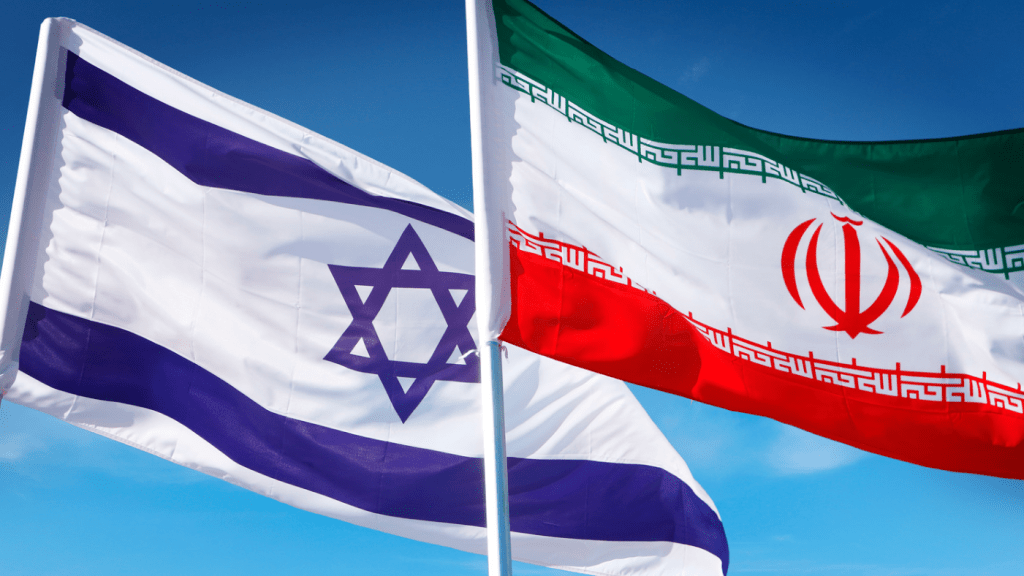As the War on Gaza began, conflict between Israel and Iran and its allies began to escalate leading to significant concerns about the possibility of an all-out regional war. The concern that the “shadow war”, going on for decades between Israel and Iran could now turn into a full-scale regional war is shared by many observers. Although Iran claimed that it had no prior information on the attack of 7 October, Israel has long perceived this attack to be a result of decades long Iranian support for Hamas and the planning of the Iranian-led “Axis of Resistance” – the Lebanese Hizballah, Yemeni Houtis, the Syrian regime and some groups in Iraq. Providing weapons and logistical support for these groups, recently also claimed to be aggressively arming some Palestinian groups in the West Bank, Iran has long been perceived as the main source of threat for Israel.
As the War on Gaza began, Iranian leadership, in close contact with the Hizballah leadership, called Israel to stop the aggression and threatened it by stating that unless it stopped the War, “Muslims and resistance forces will become impatient” and it will not be possible to stop these groups. The coming weeks saw Hizballah and Israel exchanging fire on the border and Houthis in Yemen began targeting ships linked to the US and Israel operating in the Red Sea. These exchanges mostly remained limited and rather low-key. Meanwhile Israel has been accused of assassinating Iran’s top generals in Syria. Until April 2024, Israel targeted Iranian figures in Syria, mostly with the aim of cutting the link between Iran and Syria, thus the flow of Iranian goods and support approaching its borders. Mousawi, who was responsible for coordinating the military alliance between Iran and Syria has been killed in an airstrike in Damascus on 25 December 2023; on 20 January 2024, an Israeli airstrike hit a building in Damascus killing five members of the Iranian Revolutionary Guards; on 1 March Israel, in an attack on Baniyas (Syria’s port city) targeted Revolutionary Guard commander and two others, in charge of oil shipments to Syria. Since April, Israeli attacks have become much bolder on Iran. Although Israel did not claim the attack, thirteen people were killed in an airstrike on the Iranian Consulate in Damascus, including top generals of the Quds Force on 1 April. It was daring to attack an Embassy, sanctioned by international law. Iran retaliated on April 13, by launching drones and missiles to Israel, which were almost all stopped short of hitting targets. This was the ever first attack carried out from Iran to the Israeli territory. Despite ongoing attacks and counter-attacks, until July the tit-for-tat between Israel and Iran remained limited.
However since July, the regional tension began to escalate. End of July witnessed a series of attacks by Israel targeting top Hizballah and Hamas leaders, in Lebanon and in Tehran. The recent escalation began when Israel claimed that Hizballah had attacked a village in the occupied Golan Heights. Israel, a few days later retaliated by striking southern Beirut, killing Hizballah’s top commander Fuad Shukr. While how Hizballah would respond to Shukr’s death became a serious discussion, Hamas announced the next day that its political bureau chief Ismail Haniyeh was assassinated in an airstrike while he was in Tehran for the inauguration ceremony of the new Iranian President. The assassination sent shock waves and again a concern over a retaliation that could trigger a regional war. The attack was bold and also embarrassing for Iran and was followed by the Iranian Supreme Leader Khamanei’s statement that they consider their duty to avange for Haniyeh’s blood. Hizballah, at this time, was also getting ready to retaliate for the assassination of Shukr. Haniyeh’s assassination made Yahya Sinwar the main figure in Hamas. Sinwar, is a hard-liner who since the beginning of 7 October, calls for an intense fight against Israel and argued that more blood on the Palestinian side was desired, “for it keeps the struggle and the resistance alive”. His leadership also led to further escalation in the Gaza War.
Despite the rising regional escalation and significant developments regarding Hamas after the assassination of Haniyeh, we witnessed another round of ceasefire negotiations to end the Gaza War. Hopes that once the War on Gaza ends as a result of ceasefire talks, Israeli-Iranian escalation would also wane and so would a risk of a regional war were high this time. However, as the ceasefire negotiations failed, once again, so have the hopes to cool-down the regional tension. The Gaza War continues full speed while now the Israeli Defence Forces (IDF)’s military campaign in the West Bank raises further concern over the future of Palestinians and the Israeli aggression on the Occupied Palestinian Territories as a whole. While the regional tension remain high and targeted killings are expected to continue, the possibility of Iran and its allies, to escalate the tension further and act collectively on Israel remain low. Looking at how Iran and Hizballah have so far responded to Israeli attacks, and how each responded separately and carry out limited attacks in retaliation on mostly military targets, the possibility of a collective attack remains low in the short-term. Unlike the 2006 War, Hizballah is not in an urgent domestic pressure to go to war with Israel. Iran is also not sure of the consequences of a direct military confrontation with Israel – considering the military might of not only Israel but its global and regional allies. It is possible to argue that the Israeli/Iranian escalation will continue in the coming months. Even if a ceasefire could be reached on Gaza, it might not be enough to cool down the tension as both parties are involved in a tit-for-tat move against each other. But based on capacities, domestic concerns and regional and global dynamics while the tension would continue, the possibility of a larger attack and a regional war remain rather low.

Prof. Dr. Özlem Tür is a faculty member at the Department of International Relations, Middle East Technical University. Her main research interests are Middle East politics (especially Syria, Israel and Lebanon), Turkey’s relations with the Middle East, the Palestinian issue and feminist international relations theory. Her publications include Turkey-Syria Relations – Between Enmity and Amity, edited with Raymond Hinnebusch (London: Ashgate, 2013), “Turkey and Israel in the 2000s” (Israel Studies, 2012); “Political Economy of Turkey’s Relations with the Middle East” (Turkish Studies, 2011), “Challenges of Demographic Pressures and Resource Scarcity on the Political Economy in the Levant & MENA Region”, (Journal of International Relations, 2018), “Political Economy of the Arab States – Whither any Change”, The Modern Arab State – A Decade of Arab Uprisings in the Middle East and North Africa (ed. Youssef Cherif, 2021). Prof. Tür is a research fellow at the Schusterman Center for Israel Studies at Brandeis University and at the Center for Syrian Studies at St. Andrews University.
Bu yazıya atıf için: Özlem Tur, “Israeli-Iranian Confrontation – A Looming Regional War?” , Panorama Online, 9 Ekim 2024, https://www.uikpanorama.com/blog/2024/10/09/iran-israil-ot
Telif@UIKPanorama. Çevrimiçi olarak yayımlanan yazıların tüm telif hakları Panorama dergisine aittir. Aksi belirtilmediği sürece, yayımlanan yazılarda belirtilen görüşler yalnızca yazarına/yazarlarına aittir. UİK, Global Akademi, Panorama Yayın Kurulu ile editörleri ve diğer yazarları bağlamaz.


